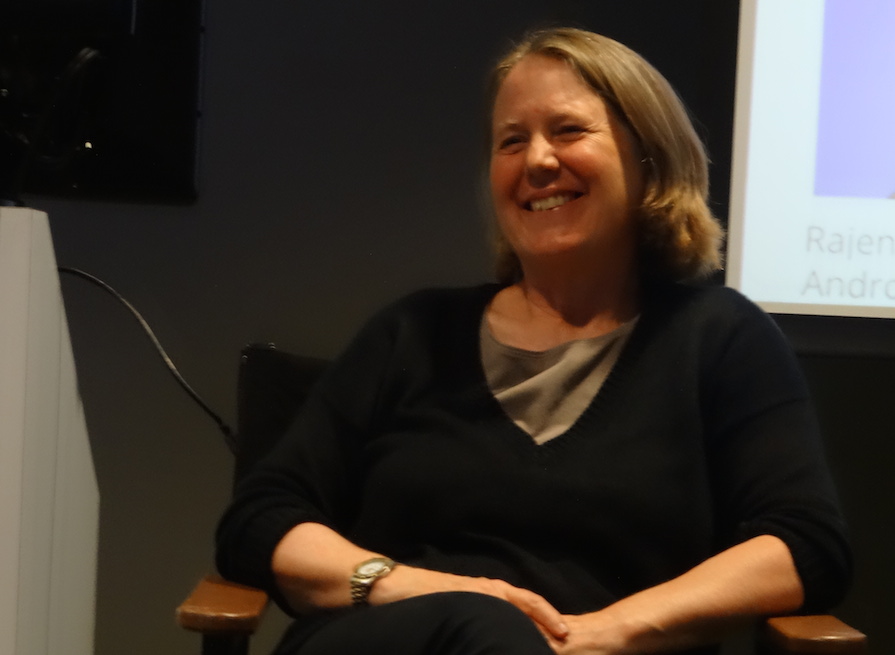 BIG DATA
BIG DATA
 BIG DATA
BIG DATA
 BIG DATA
BIG DATA
Machine learning will cost us jobs, a prominent technology executive acknowledged today, but she said job disruption isn’t the insurmountable problem that many observers fear.
Diane Greene, senior vice president in charge of Google Inc.’s cloud business, said at the Women in Data Science conference at Stanford University today that there’s “no question” that machine learning, a branch of artificial intelligence that uses data to help computers learn rather than explicitly programming them, is replacing jobs. (SiliconANGLE Media’s mobile live video studio, theCUBE, is doing live interviews at the conference. * Disclosure below.)
Already, Greene said, “machines are better than humans” at some tasks. Recently they’ve started to do better at some kinds of image and speech recognition, and they’re performing tasks such as finding signs of disease, such as retinopathy, from images more accurately than humans.
Greene said people who lose jobs as a result of these data-driven new services need to be helped. “Our society really needs to embrace people who get displaced,” she said.
She said skilled people, especially those that are computer-literate, shouldn’t have a problem getting new jobs. “This has happened before in the world,” she said, such as during the Industrial Revolution. “There’s new jobs they can easily do. It’s all about training.”
But others need to be helped through the transition. “People nearing retirement,” for example, “the world needs to value those people.” She said she met awhile ago with the chief executive of a German publisher that shut down a publishing plant that employed 300 people. The company undertook a three-year program where people could leave immediately and take a package or keep working part-time and take training for new jobs. “Each company should think through … how they’re going to manage it,” she said.
Greene isn’t the only tech executive to express these concerns, even if some such as IBM Corp. Chief Executive Ginni Rometty and venture capitalist Marc Andreessen insist such cognitive technologies will augment more than replace humans. Andrew Ng, chief scientist of Baidu Inc., also frets that we won’t train people fast enough, suggesting a guaranteed income may be needed.
Greene said that despite such dislocations, machine learning, especially via the cloud, provides many new opportunities, even in less developed areas of the world. “Cloud makes all these resources available to anyone in the world,” she said. “If you have a really good idea, it’s not so hard to bring it to life. Machine learning is getting easier and easier to use.”
More broadly, Greene used the example of her own meandering early career to illustrate that people who can pay attention to what they’re truly excited about can always find rewarding work. Greene grew up in Annapolis, Maryland, where she loved to sail, to the extent that at a couple of points, she didn’t know that she wanted to go back to college. At the University of Maryland, she was embarrassed as one of the few women in a large class of men to admit she was a psychology major, so she said she was in mechanical engineering.
She ended up not liking that very much, not least because when she started looking for work, “all the jobs looked terrible, big rows of steel desks.” On a professor’s advice, she tried naval architecture, of all things, and loved it, helping design things like boring systems for oil rigs.
There, however, she ran up against a glass ceiling. “After college, Schlumberger had told me I couldn’t go out in the field because I was a woman,” and there were no facilities for women on oil rigs, she said. “Another told me I had to wear a dress. I never wore a dress.” So she quit, moved to Hawaii and started wind-surfing. Then she got hired to run engineering for wind-surfing for a company in Southern California.
“Eventually decided I was really interested in software,” she said and went back to school at the University of California at Berkeley to get master’s in computer science. That’s where she met the man who would become her husband, Mendel Rosenblum. “That’s when my boring life started,” she joked. After jobs at Tandem Computers and Silicon Graphics, she went the startup route, ultimately co-founding VMware, now a giant in virtualization software under Dell Technologies’ wing.
Greene said women especially need to overcome trepidation about potential failure. She was asked by Google to join the company but joined the board instead, concerned she couldn’t take on the work of turning Google’s own infrastructure into a cloud service for sale. Longtime Googler Urs Hölzle, now senior vice president of technical infrastructure at Google, told her that no man would say that — ultimately persuading her to sell her startup Bebop to Google and run its enterprise and cloud businesses.
“Pay attention to your strengths,” she told attendees at the conference. “It’s best to be a little less conservative about something going wrong. Try and put them behind you and go forward.”
Of course, she conceded, that’s easier if you’re in data science: “If you get fired, someone else will certainly give you a job.”
(* Disclosure: TheCUBE is a paid media partner at the event. Neither organizers nor sponsors of the conference have editorial influence on content on SiliconANGLE or theCUBE.)
Support our mission to keep content open and free by engaging with theCUBE community. Join theCUBE’s Alumni Trust Network, where technology leaders connect, share intelligence and create opportunities.
Founded by tech visionaries John Furrier and Dave Vellante, SiliconANGLE Media has built a dynamic ecosystem of industry-leading digital media brands that reach 15+ million elite tech professionals. Our new proprietary theCUBE AI Video Cloud is breaking ground in audience interaction, leveraging theCUBEai.com neural network to help technology companies make data-driven decisions and stay at the forefront of industry conversations.